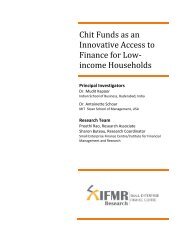Government of India Volume I: Analysis and Recommendations
Government of India Volume I: Analysis and Recommendations
Government of India Volume I: Analysis and Recommendations
You also want an ePaper? Increase the reach of your titles
YUMPU automatically turns print PDFs into web optimized ePapers that Google loves.
THE TASKS OF FINANCIAL LAW<br />
This is a superior approach from many points <strong>of</strong> view. Shifting away from sectoral<br />
laws yields consistent treatment across sectors. It has become increasingly clear that the<br />
lines that separate banking or insurance or mutual funds or pension fund management<br />
are hard to define. Under this situation, if sectoral laws are applied, regulatory arbitrage<br />
becomes feasible, where the same activity is portrayed as belonging in the sector where<br />
the law is conducive to a higher pr<strong>of</strong>it rate. Non-sectoral laws that apply uniformly across<br />
the financial system eliminate such inconsistencies <strong>of</strong> treatment. They also eliminate the<br />
problems <strong>of</strong> gaps <strong>and</strong> overlaps.<br />
While the draft Code proposed by the Commission is non-sectoral in nature, it is<br />
likely that regulators will draft sector-specific subordinated legislation. For example, the<br />
principles <strong>of</strong> consumer protection, embedded in the consumer protection part <strong>of</strong> the<br />
draft Code, will be translated by multiple regulatory bodies into detailed regulations that<br />
shape how consumers <strong>of</strong> banking or insurance are treated. The subordinated rules <strong>and</strong><br />
regulations will, however, have to be consistent with the broad principles laid down in<br />
the primary law.<br />
As an example, the term NBFC in <strong>India</strong> includes a wide array <strong>of</strong> activities. Rational<br />
<strong>and</strong> consistent treatment <strong>of</strong> a broad class <strong>of</strong> firms requires a clear conceptual framework.<br />
The approach taken by the Commission emphasises that regulation should flow<br />
from the economic <strong>and</strong> legal concern that the law seeks to address. It is useful to focus<br />
on the regulatory concerns associated with the main NBFC activities: deposit-taking, raising<br />
capital through securities issuance, <strong>and</strong> lending to consumers <strong>and</strong> investment. Under<br />
the framework proposed by the Commission, all these activities would be analysed<br />
through the objectives <strong>and</strong> powers contained in the draft Code under the parts on microprudential<br />
regulation, consumer protection <strong>and</strong> resolution. As an example, when a NBFC<br />
gives a loan to a consumer, the regulatory focus would be on consumer protection. If a<br />
NBFC does not take deposits, the nature <strong>of</strong> promises made to consumers changes, <strong>and</strong><br />
the micro-prudential regulatory strategy would be correspondingly different.<br />
In this fashion, conceptual clarity about the purpose <strong>of</strong> regulation would help regulators<br />
underst<strong>and</strong> the diverse array <strong>of</strong> financial firms <strong>and</strong> activities, <strong>and</strong> apply the suitable<br />
regulatory instruments to each situation.<br />
2.2. Adopting a principles-based approach<br />
The Commission believes that there is value in harnessing <strong>India</strong>’s common law tradition,<br />
where laws enacted by Parliament work at the level <strong>of</strong> high principles, <strong>and</strong> do not embed<br />
specific details. These relatively timeless principles are linked to the continuously<br />
evolving world <strong>of</strong> technology, institutional arrangements <strong>and</strong> financial sector processes<br />
through two methods: continuous revision <strong>of</strong> subordinated legislation that is drafted by<br />
the regulator, <strong>and</strong> interpretation by the judiciary. This approach, which may be termed<br />
an Occam’s razor applied to the field <strong>of</strong> law, has worked well with components <strong>of</strong> <strong>India</strong>n<br />
law such as the Evidence Act <strong>and</strong> the Contract Act, both <strong>of</strong> which were enacted in 1872,<br />
<strong>and</strong> have largely stood the test <strong>of</strong> time.<br />
In the field <strong>of</strong> finance, this implies a ‘principles-based’ approach. Laws will articulate<br />
broad principles that do not vary with financial or technological innovation. Regulators<br />
will write subordinated legislation that could either be in the form <strong>of</strong> detailed prescriptive<br />
rules or be principles-based, depending on the situation <strong>and</strong> the judgment <strong>of</strong> the regulator.<br />
Subordinated legislation will be frequently modified by regulators, through a process<br />
defined by Parliament, <strong>and</strong> thus constantly adapt to financial <strong>and</strong> technological innovation.<br />
This combination <strong>of</strong> legislation <strong>and</strong> subordinated legislation yields a body <strong>of</strong> law<br />
that evolves smoothly over time. For a contrast, if detailed features <strong>of</strong> financial products<br />
FINANCIAL SECTOR LEGISLATIVE REFORMS COMMISSION 13



